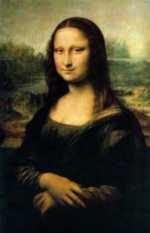DiCaprio or DaVinci??
You cannot be looking 50 plus in the eyes without having a great sense of humor and a view to the future. My esteemed colleague, Professor Mark Burgin, a Visiting Scholar at UCLA, and, in my opinion, a brilliant scientist, philosopher and logician, has very sweetly sent me his list of other brilliant minds.
They all made their significant contribution to the world AFTER 50. Here are a few of the great ones: after 50:
- Plato
- Leonardo da Vinci (VERY popular of late due to the DaVinci Code!)
- Leonard Euler
- Johann Sebastian Bach
So for a very special treat, here is Dr. Burgin's synopsis on the life of Leonardi da Vinci.
After the invasion by the French and Ludovico Sforza's fall from power in 1499, Leonardo was left to search for a new patron. Over the next 16 years, Leonardo worked and traveled throughout Italy for a number of employers, including the dastardly Cesare Borgia. He traveled for a year with Borgia's army as a military engineer and even met Niccolo Machiavelli, author of "The Prince." Leonardo also designed a bridge to span the "golden horn" in Constantinople during this period and received a commission, with the help of Machiavelli, to paint the "Battle of Anghiari."
About 1503, at the age of 51, Leonardo reportedly began work on the "Mona Lisa." [considered one of the greatest works of art in all of history.]
On July 9, 1504, he received notice of the death of his father, Ser Piero. Through the contrivances of his meddling half brothers and sisters, Leonardo was deprived of any inheritance. The death of a beloved uncle also resulted in a scuffle over inheritance, but this time Leonardo beat out his scheming siblings and wound up with use of the uncle's land and money.
From 1513 to 1516, he worked in Rome, maintaining a workshop and undertaking a variety of projects for the Pope. He continued his studies of human anatomy and physiology, but the Pope forbade him from dissecting cadavers, which truly cramped his style.
Following the death of his patron Giuliano de' Medici in March of 1516, he was offered the title of Premier Painter and Engineer and Architect of the King by Francis I in France. His last and perhaps most generous patron, Francis I provided Leonardo with a cushy job, including a stipend and manor house near the royal chateau at Amboise.
For more in-depth information on this true Renaissance man, here is a great site: http://www.mos.org/leonardo/
Stay tuned for more of Dr. Burgin's top picks (including Genghis Khan!) in the coming days...










